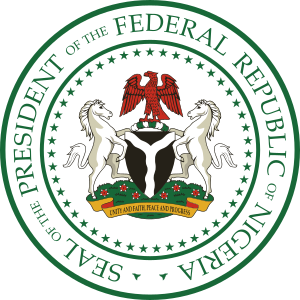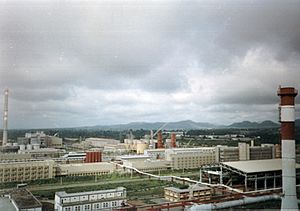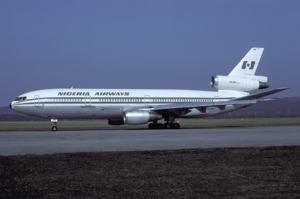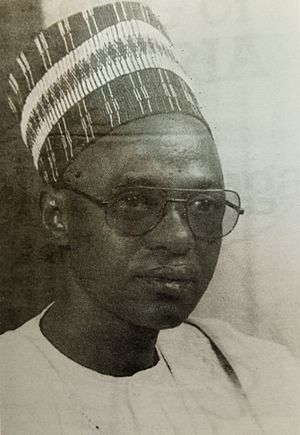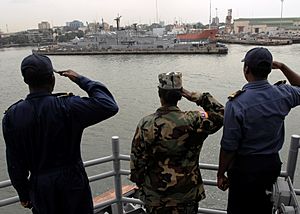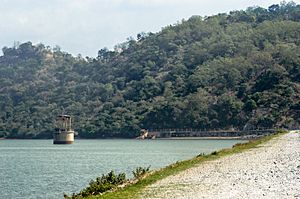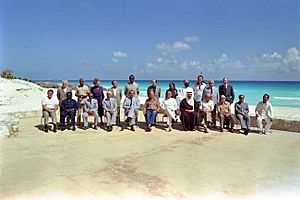Shehu Shagari facts for kids
Quick facts for kids
Alhaji
Shehu Shagari
|
|||||||||||||||||||||||||||||||||||||||||||||||||||||||||
|---|---|---|---|---|---|---|---|---|---|---|---|---|---|---|---|---|---|---|---|---|---|---|---|---|---|---|---|---|---|---|---|---|---|---|---|---|---|---|---|---|---|---|---|---|---|---|---|---|---|---|---|---|---|---|---|---|---|
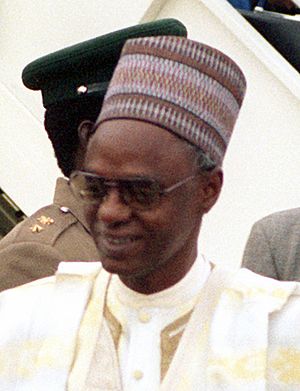
Shagari in 1980
|
|||||||||||||||||||||||||||||||||||||||||||||||||||||||||
| 6th President of Nigeria | |||||||||||||||||||||||||||||||||||||||||||||||||||||||||
| In office 1 October 1979 – 31 December 1983 |
|||||||||||||||||||||||||||||||||||||||||||||||||||||||||
| Vice President | Alex Ekwueme | ||||||||||||||||||||||||||||||||||||||||||||||||||||||||
| Preceded by | Olusegun Obasanjo as Military Head of State of Nigeria | ||||||||||||||||||||||||||||||||||||||||||||||||||||||||
| Succeeded by | Muhammadu Buhari as Military Head of State of Nigeria | ||||||||||||||||||||||||||||||||||||||||||||||||||||||||
|
|||||||||||||||||||||||||||||||||||||||||||||||||||||||||
| Personal details | |||||||||||||||||||||||||||||||||||||||||||||||||||||||||
| Born | 25 February 1925 Shagari, Northern Region, British Nigeria (now Shagari, Sokoto State, Nigeria) |
||||||||||||||||||||||||||||||||||||||||||||||||||||||||
| Died | 28 December 2018 (aged 93) Abuja, Nigeria |
||||||||||||||||||||||||||||||||||||||||||||||||||||||||
| Political party | National Party of Nigeria | ||||||||||||||||||||||||||||||||||||||||||||||||||||||||
| Spouses |
Hadiza Dawaiya
(m. 1957)Aisha Shagari
(died 2001) |
||||||||||||||||||||||||||||||||||||||||||||||||||||||||
| Children | Muhammad Bala Shagari Aminu Shehu Shagari Abdulrahman Shehu Shagari |
||||||||||||||||||||||||||||||||||||||||||||||||||||||||
| Relatives | Bello Bala Shagari (grandson) | ||||||||||||||||||||||||||||||||||||||||||||||||||||||||
Shehu Usman Aliyu Shagari (25 February 1925 – 28 December 2018) was a very important Nigerian leader. He was the first person to be chosen as President of Nigeria by the people through a democratic election. This happened in 1979 after the military government, led by General Olusegun Obasanjo, handed power back to civilians. This period is known as the Second Nigerian Republic.
Before becoming president, Shehu Shagari was a teacher. He then became involved in politics in 1951. He held many important government jobs as a minister between 1958 and 1975. As president, he led a major effort in 1983 to send many West African migrants, especially from Ghana, back to their home countries.
Contents
Shehu Shagari's Early Life
Shehu Usman Shagari was born on 25 February 1925 in a town called Shagari, in what was then the Northern Region of British Nigeria. His family were Fulani and followed the Muslim faith. His great-grandfather, Ahmadu Rufa'i, founded the town of Shagari.
Shehu grew up in a large family and was the sixth child. His father, Aliyu Shagari, was the village head, known as the Magajin Shagari. Before becoming a village head, Aliyu was a farmer, trader, and herder. Shehu's father died when he was only five years old. His older brother, Bello, then became the Magajin Shagari for a short time.
Shehu started his education at a Quranic school. From 1931 to 1935, he attended Yabo elementary school. He then went to middle school in Sokoto from 1936 to 1940. After that, he studied at Barewa College from 1941 to 1944. From 1944 to 1952, he trained to be a teacher at the Teachers Training College in Zaria, Kaduna. From 1953 to 1958, Shagari worked as a visiting teacher in Sokoto Province. He also helped choose students for scholarships as a member of the Federal Scholarship Board.
Starting His Political Journey
Entering Politics
Shehu Usman Shagari officially entered politics in 1951. He became the secretary of the Northern People's Congress (NPC) in Sokoto, Nigeria, and held this role until 1956. However, his interest in politics began earlier, in 1945. As a teacher, he started a youth group called the Youth Social Circle in Sokoto. This group later joined with others to form the Northern People's Congress (NPC) in 1948.
In 1948, a famous Nigerian leader, Dr. Nnamdi Azikiwe, visited Nigeria to raise money. He wanted to send a group to London to ask the British to change the "Richard's constitution," which many felt was unfair. Shehu Shagari was the only person from Sokoto to attend this meeting. When his British education officer found out, Shagari's salary increase was delayed as a punishment.
The newspaper "West African Pilot" was banned in northern schools. Shagari wrote an article in 1948 asking for it to be allowed again. At the same time, he started speaking out against colonial rule. He even wrote a Hausa poem called "Anti-Colonialist" and shared it widely. In 1950, when he was just 25, Shagari was chosen to attend a conference in Ibadan. There, he discussed the Richards Constitution.
Becoming a Member of Parliament
In 1954, Shehu Shagari was elected to his first public office. He became a member of the federal House of Representatives for Sokoto west. In 1958, he was appointed as a parliamentary secretary to Nigeria's Prime Minister, Sir Abubakar Tafawa Balewa. He also served as the Federal Minister for Commerce and Industries that year.
Serving as a Minister
From 1959 to 1960, Shagari was the first Federal Minister for Economic Development in independent Nigeria. His ministry was in charge of creating the country's development plan for 1962–1968. It also helped set up the Niger-Delta Development Board.
From 1960 to 1962, he was the Federal Minister for Pensions. In this role, he worked to ensure that more Nigerians held civil service jobs. From 1962 to 1965, Shagari was the Federal Minister for Internal Affairs. From 1965 until the first military coup in January 1966, Shagari served as the Federal Minister for Works. He oversaw many important projects, including the Eko Bridge in Lagos. This was the first big project for the German construction company Julius Berger in Nigeria. He also completed the Niger Bridge, which was opened in 1966 by Prime Minister Sir Abubakar Tafawa Balewa.
In 1967, he became the secretary for the Sokoto Province Education Development Fund. From 1968 to 1969, Shagari held a state position in the North-Western State as Commissioner for Establishments.
As a Member of Parliament and a Federal Minister, Shagari traveled abroad for several Nigerian missions. He attended conferences like the United Nations Economic Commission for Africa (ECA) meeting in Tangiers. In 1961, he led a group to celebrate Libya's tenth Independence Day. He also attended the GATT Ministerial conference in Geneva, where he spoke about how the European Economic Community (EEC) was treating African countries unfairly.
In 1962, he led a group to the ECA meeting in Addis Ababa. He strongly pushed for stable prices for products from tropical countries. In 1965, he attended a conference in New Zealand. There, he strongly criticized Ian Smith's declaration of independence for Rhodesia (now Zimbabwe). Shagari's speech was very impactful and received praise from other delegates.
He also represented Nigeria at the first meeting of the Economic Social Commission of the Organisation of African Unity (OAU). Shagari also represented the Prime Minister on different occasions, including Winston Churchill's funeral.
Before Becoming President
After the First Republic Ended
After the 1966 Nigerian coup d'état, Shagari was one of the government officials who handed power to the military leader, Maj. Gen. Aguiyi Ironsi. He then went back to Sokoto to focus on education. In 1967, he worked as the Executive Secretary of the Sokoto Province Education Development Fund, where he helped build many schools. He was later appointed as Commissioner of Establishment and Training. He also served briefly as Commissioner for Education in the North Western States before being asked to serve under the military government of Gen. Yakubu Gowon.
Minister After the Civil War
After the Nigerian civil war, from 1970 to 1971, General Yakubu Gowon appointed Shagari as the federal commissioner for economic development, rehabilitation, and reconstruction. His work helped carry out Gowon's policy of bringing the country back together. Shagari began rebuilding schools, hospitals, and other structures in the South East. He also worked to convince people from the South East to rejoin the civil service. He helped negotiate the release of Biafran political prisoners.
From 1971 to 1975, he was the Federal Commissioner (now called minister) of Finance. During this time, Shagari also served as a governor for the World Bank. He was also a member of the International Monetary Fund (IMF) committee. As the Federal Minister of Finance, Shagari launched Nigeria's current currency, the Naira. In 1976, Shagari started the Nigeria Trust Fund in the African Development Bank with $100 million. This fund was created to help poor African countries pay for their development projects.
As a minister under Gowon, Shagari also went on a peace mission. He helped mediate between Julius Nyerere of Tanzania and Idi Amin of Uganda to prevent a war. After serving under Gen. Yakubu Gowon, he returned to Sokoto. There, he became the Chairman of the Sokoto State Urban Development Authority (SUDA). During this time, he began building the Sokoto Modern Market. In 1976, Shagari was elected as a counselor for Yabo Local Government.
Becoming President
Afterward, he was part of the assembly from 1977 to 1978 that wrote the 1979 constitution. In 1978, Shehu Shagari helped create the National Party of Nigeria. In 1979, the party chose Shagari as their candidate for the presidential election. He won the 1979 election with the help of his campaign manager, Umaru Dikko. His campaign was supported by many important politicians from the North and southern minority groups. The party's slogan was "One Nation, One Destiny." It was seen as the party that best represented Nigeria's diverse people.
Shehu Shagari's Presidency
Economic Focus
During the time when oil prices were high, Shagari focused his government's economic goals on Agriculture, Industry, Housing, and Transportation.
Agriculture Shagari's government started a "Green Revolution" program. This program gave seeds and fertilizers to farmers to help them grow more food. The goal was to encourage the use of machines in farming. This helped large farms produce a lot of food. He also opened several dams, including the Bakalori Dam in Sokoto State and the Dadin Kowa Dam in Bauchi State.
Industry
In 1980, using money from oil, Shagari finished building the Kaduna refinery, which began working that year. He also started building the Ajaokuta Steel Mill, which was almost finished by 1983. This was the biggest steel project ever in Africa at that time. It was called the "bedrock of Nigeria's industrialization."
Shagari completed the Delta Steel complex in 1982. In 1983, he created the Aluminum Smelter Company of Nigeria at Ikot Abasi. Three other Steel Rolling Mills were built in Osogbo, Katsina, and Jos. Shagari also set up a Petroleum Training Institute.
There were also car manufacturing plants like ANAMMCO in Anambra, opened in 1980. Other plants included Volkswagen in Oyo State and Peugeot Automobile in Kaduna State.
Housing Shagari aimed to build 200,000 housing units. By June 1983, about 32,000 units were finished. Even with its challenges, it was the largest public housing project Nigeria had ever seen.
Transportation
In transportation, he launched many road networks across the country. These included roads leading to the new Federal Capital Abuja. Other important roads built were Lagos-Kano and Port Harcourt-Enugu.
Shagari also built and improved some seaports, like the Sapele Ports Complex. He started the Federal Ocean Terminal in Port Harcourt. New river ports were also built and modernized, including one in Onitsha.
In aviation, Shagari created the Ministry of Aviation. He built three new airports in Minna, Bauchi, and Akure. New passenger planes were bought for Nigerian Airways, making it the largest airline network in Africa at the time.
Financial Challenges
Oil prices started to drop in 1981, which affected Nigeria's government finances. Shagari did not want to fully accept the financial plans from the IMF and World Bank. Instead, he started an Economic Stabilization Program. This program aimed to limit imports, reduce government spending, and increase customs duties. However, these efforts had only a small impact.
Fighting Corruption
While Shehu Shagari himself was found not to be involved in corrupt actions, his government faced many accusations of corruption. This included claims of cheating in the 1983 election. These issues, along with falling oil prices and financial problems, made life hard for citizens. This made the government very unpopular.
However, in his second term, Shagari tried to fight corruption. He created a new Ministry of National Guidance for this purpose. A new program called Ethical Revolution was introduced. This program included the famous War Against Indiscipline, which was later launched under Gen. Muhammadu Buhari. This ministry only lasted three months before the 1983 military takeover. In his short second term, Shagari kept only 7 out of 45 ministers from his previous government. This showed his commitment to fighting corruption, but it did not stop the military from taking over.
Government Achievements
Shagari's government achieved a lot in education. During his four years, secondary schools improved greatly, and the number of teachers in training colleges increased. In 1981, a big campaign to teach people to read and write was launched. In 1982, a new 6–3–3–5 education system was introduced.
Shagari's government also built many higher education institutions in Nigeria. New Universities of Technology were set up in Bauchi, Benue, Adamawa, Ondo, Imo, and Osun States. These included Federal University of Technology Yola and Federal University of Technology Akure. His government also upgraded seven existing colleges to offer degrees. Eight new Federal polytechnics were also established. The Federal Open University was also created in 1981. The government also offered scholarships for students to study abroad.
Shagari's presidency is remembered for encouraging women and young people to be part of nation-building. He told states to include at least one woman and one youth among their nominees for government positions. He even chose a woman from Imo State as his running mate for Vice President during his campaign. She later declined due to lack of support from her region. However, Shagari appointed the first female Ministers and diplomats in Nigeria. He appointed Ebun Oyagbola as Minister of National Planning and later an Ambassador. He also appointed Mrs. Janet Akinrinade as State Minister of Internal Affairs, and two other female Ministers. Several young people also joined Shagari's government as Ministers and Advisers. For example, Prof. Pat Utomi was 29 when he became an Economic Adviser.
National Issues
Military Development
During Shagari's one term, the Nigerian Armed Forces grew much stronger. Nigeria bought most of its advanced weapons during this time. Military spending under Shagari was the highest in Nigeria's history. This included Alpha Fighter Jets, MIG Fighter Jets, and C-130H-30 Hercules transport aircraft. The NNS Aradu (F89), which is the most advanced ship of the Nigerian Navy, was also acquired during his time.
Maitatsine and Kano 1980 Riot The Kano 1980 riot was a major religious conflict in Kano, Nigeria. It was led by a preacher named Maitatsine and his followers. Over 4,177 civilians, 100 policemen, and about 35 military personnel were killed. This riot is seen as the start of the Yan Tatsine movement. There was a belief that Nigeria's safety and economy were at risk from illegal foreigners. This was because some West African nationals were involved in armed robberies. The army was called in to stop the violence before it spread further.
Deportation of Migrants In 1983, Shagari ordered immigrants without proper documents to leave Nigeria or face arrest. This order was given after religious disturbances in 1980 and 1981. Most of the affected immigrants were West Africans, mainly Ghanaians. Over 2 million people were affected.
Federal Capital Territory Before Shagari became president, Abuja was mostly undeveloped land. Shehu Shagari started building the first structures of the new city. This included the road from Suleja to the capital city site. Other important developments included electricity, water systems, and roads.
The Usman Dam was built in 1980 to provide water for the future city. The city was also connected to the national electricity grid. A new airport runway was also built, which is now the Nnamdi Azikiwe International Airport.
Other projects included 5,000 homes for federal workers, a presidential guest house (Aguda House), and the construction of the State House and National Assembly. Three five-star hotels, schools, and hospitals were also being built. By 1983, Abuja had become a working city where government meetings and national celebrations were held. When Shagari was removed from office, he was on vacation in Abuja. Abuja has since grown into a large city and is now Nigeria's Federal Capital Territory.
Foreign Relations
Shagari's presidency continued Nigeria's foreign policy, which had focused on Africa since 1960. Shagari was already experienced in foreign relations, having led many Nigerian groups on missions abroad. His government strongly opposed apartheid in South Africa and white minority rule in Zambia and Zimbabwe. He believed in supporting the fight for freedom in these countries. He made his views clear during his visits to the United Kingdom and the United States. President Jimmy Carter congratulated him on Zimbabwe's independence. Letters between President Shagari and Prime Minister Margaret Thatcher show that he put a lot of pressure on Britain regarding Zimbabwe's independence.
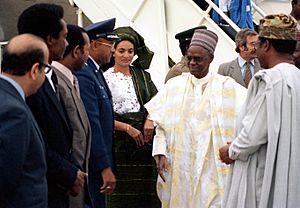
In 1980, during Zimbabwe's independence celebration, President Shagari promised $15 million. This money was to train Zimbabweans in their own country and send experts to Nigeria for training. Zimbabwe's government used some of the money to buy newspaper companies owned by South Africans. This increased the government's control over the media. The rest of the money went to training students in Nigerian universities and soldiers in the Nigerian Defence Academy.
Shagari also tried to build connections between Nigeria and African Americans during his visits to the United States. In Harlem, he hosted a dinner for Black leaders and spoke about the need for economic ties with African Americans.
However, after the 1980 U.S. election, which brought President Ronald Reagan to power, Nigeria's relationship with the U.S. became strained. This was especially true during the 1980 Summer Olympics boycott, which Nigeria refused to join. President Shagari insisted on Nigeria's policy of not taking sides. He took part in the Russian Olympics despite efforts by the Carter Administration. The famous boxer Muhammad Ali was sent to Nigeria to try and convince Shagari, but Shagari refused to meet him.
In Africa, Nigeria had border disputes with Chad and Cameroon. These almost led to war, but Shagari carefully avoided conflict. Shagari's government strongly supported ECOWAS (Economic Community of West African States). He even provided land for its headquarters in Abuja. However, despite his efforts to make peace with neighbors, his government sent away undocumented immigrants, mostly Ghanaians, in 1983. This action was popular with Nigerians but criticized by others. It is known as "Ghana Must Go."
After Being President
End of the Second Republic
Shagari ran for a second four-year term in 1983 and won the election. However, he was later overthrown and arrested by General Muhammadu Buhari in a military coup on 31 December 1983.
Books by Shehu Shagari
- Beckoned To Serve (His life story)
- The Challenge of Change (A collection of his speeches)
- Wakar Nijeriya or Song of Nigeria (Poetry)
- Uthman Dan Fodio: The Theory and Practice of His Leadership
- My Vision for Nigeria
His Death
Shehu Shagari passed away on 28 December 2018, around 6:30 PM. He died from a short illness at the National Hospital, Abuja, where he was receiving treatment. His grandson Bello Bala Shagari and Governor Tambuwal confirmed his death in social media posts.
Titles and Honours
Traditional Titles
In 1962, the Sultan of Sokoto, Siddiq Abubakar III, gave him the title of Turaki of the Sokoto Sultanate. Turaki means an officer at the court, referring to the sultan's palace in Sokoto. He also held other traditional titles: the Ochiebuzo of Ogbaland, the Ezediale of Aboucha, and the Baba Korede of Ado Ekiti.
National Awards
 Grand Commander of the Order of the Federal Republic (GCFR)
Grand Commander of the Order of the Federal Republic (GCFR) Grand Commander of the Order of the Niger (GCON)
Grand Commander of the Order of the Niger (GCON)
Marriages and Family
Shehu Shagari had three wives: Amina, Aisha, and Hadiza Shagari. He had several children, including Muhammad Bala Shagari and Aminu Shehu Shagari. On 24 August 2001, his wife, Aisha Shagari, died in a London hospital at age 49. Hadiza Shagari, at 80 years old, died from COVID-19 complications in Abuja on 12 August 2021.
See also
 In Spanish: Shehu Shagari para niños
In Spanish: Shehu Shagari para niños
- Cabinet of Shehu Shagari
- List of presidents of Nigeria
- Sokoto
 | Kyle Baker |
 | Joseph Yoakum |
 | Laura Wheeler Waring |
 | Henry Ossawa Tanner |


